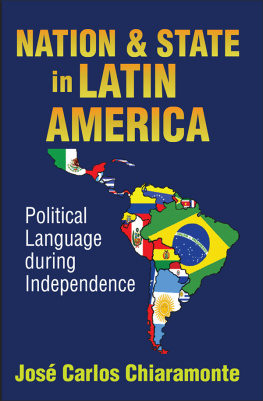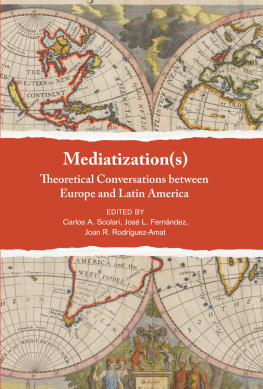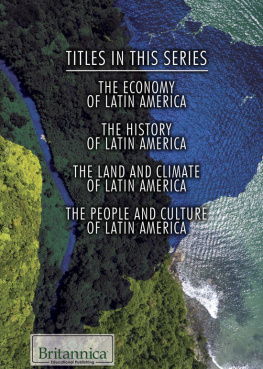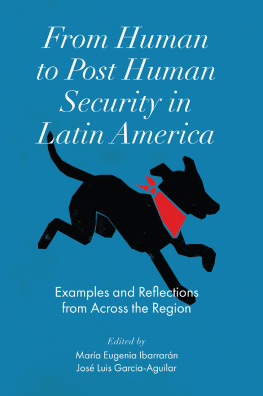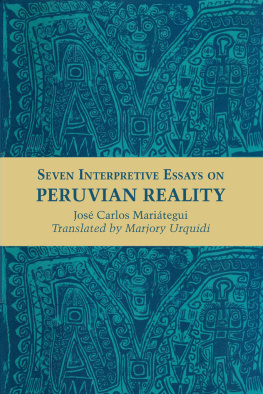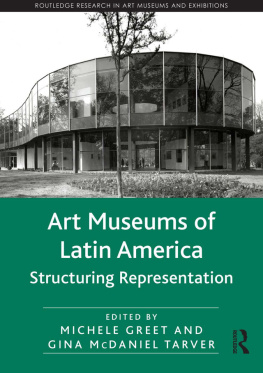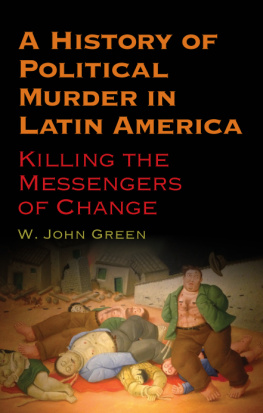NATION & STATE in LATIN AMERICA
NATION & STATE in LATIN AMERICA
Political Language during Independence
Jos Carlos Chiaramonte
Originally published in 2010 by Editorial Teseo.
Published 2012 by Transaction Publishers
Published 2017 by Routledge
2 Park Square, Milton Park, Abingdon, Oxon OX14 4RN
711 Third Avenue, New York, NY 10017, USA
Routledge is an imprint of the Taylor & Francis Group, an informa business
Copyright 2010 by Jos Carlos Chiaramonte.
All rights reserved. No part of this book may be reprinted or reproduced or utilised in any form or by any electronic, mechanical, or other means, now known or hereafter invented, including photocopying and recording, or in any information storage or retrieval system, without permission in writing from the publishers.
Notice:
Product or corporate names may be trademarks or registered trademarks, and are used only for identification and explanation without intent to infringe.
Library of Congress Catalog Number: 2011035544
Library of Congress Cataloging-in-Publication Data
Chiaramonte, Jos Carlos.
[Nacisn y estado en Iberoamirica. English.]
Nation and state in Latin America : political language during independence / Jose Carlos Chiaramonte. p. cm.
Originally published: Buenos Aires : Teseo, c2010, in series: Coleccisn Instituto Ravignani.
Includes bibliographical references.
ISBN 978-1-4128-4622-6
1. Political science--Latin America--History. 2. Latin America-- Politics and government--18th century. 3. Latin America--Politics and government--1806-1830. 4. State, The. 5. Nation-state. I. Title.
JA84.L3C4713 2012
320.98014--dc23
2011035544
ISBN 13: 978-1-4128-4622-6 (pbk)
English Translation by Ian Barnett
MA Oxon, DipTrans loL, MIL
Parole Translations & Literary Agency
TABLE OF CONTENTS
Nation and State in Latin America
I must highlight with gratitude the input by Prof. Nora Souto who participated actively in the search of crucial information for several parts of this book, assisted me in writing the summary contained in the Foreword and made clever comments on the draft of the present edition. Likewise, I want to thank Prof. Julin Giglio for his intelligent assistance in the final revision of the manuscript of the book and the many improvements he suggested. And, finally, I must acknowledge too the many enriching contributions arising out of discussions and exchanges of ideas with associates and colleagues at the Instituto de Historia Argentina y Americana Dr. Emilio Ravignani
Studying the history of the birth of the national States has profound contemporary political resonance. Although a reexamination of the basis of our ideas about the emergence of contemporary nations will always be politically useful, I should advise the reader that the works making up this book do not belong to that field. Their motivation is strictly historiographical and every effort has been made to avoid any spurious relation of history and politics through the anachronistic projection of contemporary models onto the past. This is not to say that I do not admit historys usefulness in the political realm once it has shed any such distortion.
One of the central assumptions informing all my analysis is that, in using the term nation, we are not referring to a single historical reality -not even of the modern day- but to a concept that could be applied to different realities depending on the meanings ascribed to them by the protagonists of these histories. It is imperative here to recognize three distinct issues that can be confused. First is the use of the word nation, which is often implicitly reduced to a label for one of the many different entities it has been associated with over the years, namely, the contemporary national State. Second is the terms reference without this limitation. Here it refers to a human group, which may or may not be the political organization eventually called a State. And third -easily confused with the first issue because of the shifting usage of the term nation- is the justification of the legitimacy of the contemporary national State. This legitimization was initially made in terms of the contract theory, at a time when -as I explain in the first chapter- nation lacked any overtones of ethnicity, being a straightforward synonym for state. Such legitimization lasted until the advent of the principle of nationalities, which remade it in ethnic terms, when the term nation was indissolubly linked to the modern concept of nationality.
Historiography about the national question displays two main ways of interpreting the concept of nation: first, one that assumes that the term refers to a reality that the historian must define appropriately in order to write its history; second, one that concerns itself with the different meanings of the terms usage, and the historical realities to which it refers. As I suggest at the end of the first chapter, my own feeling is that the historical problem surrounding the use of the concept nation consists in appreciating these mutations in meaning not as belonging to the truth or falsity of a definition, but to processes of explanation of the emergence of national States. I feel we have been wasting time trying to explain what the nation is, as if some entity with a fixed essence existed under that name. Instead, we should be focusing on the development of the forms of state organization, whose most recent expression has been the emergence of national States, and leave the explanation of nation as an ethnically defined human group to anthropology.
Another of the major alternatives these works attempt to avoid is to interpret contemporary nations in either iden- titarian -to use a common neologism- or rationalist terms. It may not be wide of the mark to see in the alternative of founding the nation on forms of identity or contract political decisions a reflection of the collision of the emotional and the rational in historical interpretation, which has had wide repercussions since the spread of Romanticism. But, as I have pointed out, my intention lies elsewhere, namely, to identify the motivations of the leading figures involved in the process of forming nations, the periods views concerning the nature of the political organizations being formed and, consequently, the particular contemporary usage of the relevant political vocabulary.
The Introduction contained in examines the effects on historians of the ideological and methodological prejudice spread by nationalism in the interpretation of the birth of the Latin American nations. Among ideological prejudices there is the assumption that todays Latin American nations already existed in the early 19th century when the round of Latin American independences began. This assumption is the result of associating nation with nationality, hence inferring the late colonial existence of communities that claimed their right to form independent states by virtue of a common culture. This anachronism -insofar as the notion of nationality as a basis for political legitimacy did not yet exist- has consequences too for methodology: it has tended to lead historians to study only those aspects of the colonial past they find meaningful to an explanation of the origins of the subsequent nations, while interpreting feelings of collective identity as the germs of national feelings and finding protonationalisms at every turn.


